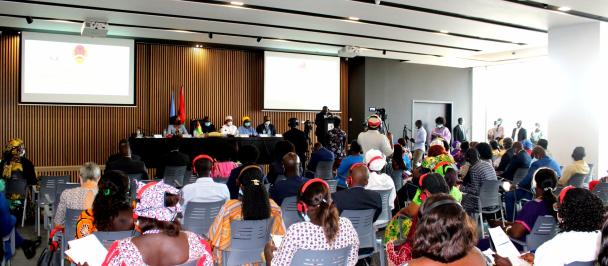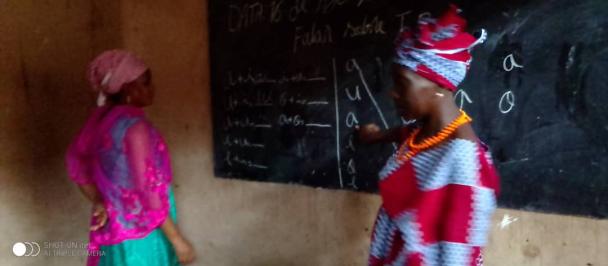There are still significant challenges for rural women in Guinea-Bissau. Concentrated mainly in less visible, subsistence agricultural production and domestic work, amplified by economic, political, cultural, and social barriers, the constraints women face are well stated. Yet official labour statistics do not reflect their high participation in the provision of care and services for their family and communities, agriculture, and informal sector nor the longer durations they work. Women are responsible for ferrying goods, water, children, fuel, market goods, and household supplies. They do all manual labour at the household level besides farm work and manual agro-processing. Development cannot proceed without these women’s contributions. UNDP Guinea-Bissau is at the forefront of reversing the narrative for rural women by supporting inclusive development programmes to help overcome their obstacles. From designing specific programs for rural women to integrating rural women in existing programs, the role of UNDP is already in evidence: rural women participation in the revision of the constitution, in political dialogues and processes as well as small grants schemes, etc. Inclusive COVID-19 response offer As part of its national COVID-19 response offer in Guinea-Bissau, UNDP has been supporting several local initiatives in the health, justice, human rights, economy sector among others, aiming to limit the socio-economic impact of the virus among the most vulnerable groups. Since the launch of the platform in early June, thousands of people, (most of them women) were sensitized. Support local communities in implementing local solutions Local communities are best placed to develop tailored solutions to their daily challenges. This is why the UNDP in Guinea-Bissau last October, as part of the community support platform Na Nô Mon, launched a Small Grants Scheme aimed at providing local change-makers with the opportunity to take action about the problems they suffer from. Over a period of three months, the UNDP received more than 76 proposals that through community engagement, voice, and participation advance initiatives that address social, environmental, or economic challenges in communities, raise ambition for sustainable development actions, develop skills and volunteering opportunities for local people to become active members of their community, and ultimately, foster communications between local communities and authorities. Grants were provided to ten organizations that will lead projects that aim to ensure digital literacy of vulnerable groups, promote women’s rights and fight against gender-based violence, foster inclusion of people with disabilities and leave no one behind. A gender lens in the revision of the Constitution The CSO Bissau-Guinean Women’s Jurists Association presented on 30 June 2021 their revision suggestions to Guinea-Bissau’s Constitution, in order to raise awareness on the gender topic at the Plenary Session of the National People's Assembly in the presence of Members of Parliament from the 6 parties with a seat at the National Assembly. This will be the sixth revision of Guinea-Bissau’s Constitution since its independence from Portugal in 1974. With the technical support of the UNDP Guinea-Bissau and financial support of the UN Peacebuilding Fund, the association held brainstorming sessions in the eight regions of the country, as well as in Bissau with women members of parliament, civil society organizations, political parties leaders, and other sovereign organs, to gather ideas and information about the needs of women and men in what they want to see in a revised Constitution. The voices of rural women heard nationwide were fundamental to understanding their views on the need to reinforce women’s rights guaranteed in the Constitution of the Republic. Currently, there are several significant gaps in the constitution when it comes to women’s rights, says the group: “There is a long way between the balance of social, political and economic roles of women in present-day Guinea Bissau.”-Poverty affects women more, even though 55 percent of agriculture production is carried out by women; -Unpunished customary or religious practices prevailing against the dignity, body, and health of women: 42 percent of women aged 15 to 49 consider it acceptable for a husband to beat his wife; -Discrimination: Male values and attitudes prevail in major national decisions and politics and a culture of “matchundadi” prevails; -45 percent of women are literate; -60 percent of Bissau-Guinean women are married to men at least 10 years older; -37 percent of girls marry before 18 (compared to only 3.7 percent of boys); -50 percent of girls up to the age of 14 have been subjected to female genital mutilation. Empowering rural women to strengthen their voice to participate in political processes at the local, regional and national levels Building capacity and empowering rural women is an important step toward a more inclusive and democratic society. Women need to have more knowledge, skills, and voice to ensure they are able to participate in key ongoing reforms and political processes in Guinea-Bissau. This is the rationale of the Political Stabilization and Reform through Confidence Building and Inclusive Dialogue project, implemented by UNDP, UNFPA, and WFP with the support of the Peacebuilding Fund, Under this project, the NGO Tiniguena is conducting the activity “Rural Women – guarantees of production, secure in their rights and in peacebuilding.” Regional rural women forums and training for women in human rights, land access, family economy, conflict management, and access to justice were some of the capacity buildings undertaken in the Gabú region for over 500 women to promote the social integration of rural women, to promote and raise awareness on their rights. Only by empowering women do we engage them more in the political dialogues.
International Day of Rural Women 2021
October 15, 2021
Related Content

 Locations
Locations


